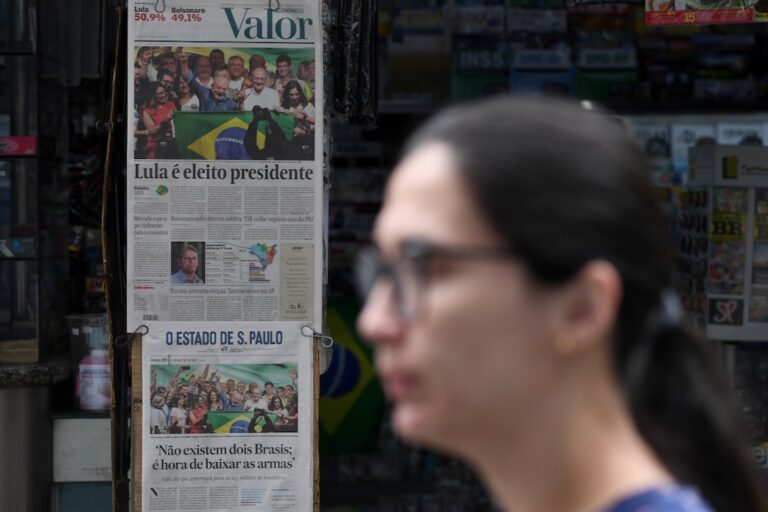(PERIODISTAS/IFEX) – On 20 and 22 February 2001, journalists Nilson Mariano and Altair Nobre, of the daily “Zero Hora” in Porto Alegre, were the target of threats and intimidation from police headquarters. The police demanded the journalists reveal their sources of information in a case which involves the Civil Police’s chief commissioner, Pedro Urdangarin. On […]
(PERIODISTAS/IFEX) – On 20 and 22 February 2001, journalists Nilson Mariano and Altair Nobre, of the daily “Zero Hora” in Porto Alegre, were the target of threats and intimidation from police headquarters. The police demanded the journalists reveal their sources of information in a case which involves the Civil Police’s chief commissioner, Pedro Urdangarin.
On 10 February, “Zero Hora” published official documentation about a judicial hearing investigating allegations brought forward by an agricultural worker in San Jeronimo. The man claimed that a local police inspector had extorted money from him and that then regional chief Urdangarin had done nothing in response. On 8 September 2000, by means of official order 974, Justice and Security Judge Luiz Goulart Filho requested that the Civil Police’s Office of the General Commissioner investigate the commissioner for the alleged crime of “passive corruption”.
According to the law, the legal proceedings should have remained confidential. However, the document was leaked on the precise day that Urdangarin assumed the position of chief commissioner, and became, paradoxically, the head of the same body that had been investigating his conduct since September.
On 20 February, journalist Mariano was called in to appear before the chief of police in Porto Alegre. However, police officers Marcelo Moreira da Silva and Gabriela Monteiro did not question him about the investigation concerning Urdangarin, but instead demanded Mariano reveal who had provided him with information about the confidential legal proceedings. In addition, they warned him that by refusing to name his source he could be charged with giving false testimony, a charge that is punishable by fines and even imprisonment.
As Mariano decided to exercise his constitutional right and his professional obligation not to reveal his sources of information, the police summoned Mariano’s immediate supervisor, Nobre. The editor was even interrogated about personal matters and was also warned that he could be charged if he refused to respond.
The police headquarters head, Commissioner Carlos Santana, felt that a judicial secret had been violated as a result of the contents of the report being made known and that this irregularity should be investigated. “The official who leaked this document committed a crime. The journalists were called as witnesses because it was the only way to investigate this crime,” he stated, but “by concealing information which is important to the case for us, it is possible that they have given ‘false testimony’. They have hidden the truth, because they know who gave them the document.”
A number of organisations and individuals expressed their concern over the incident. The Rio Grande do Sul Union of Journalists condemned the police’s attitude as “contrary not only to the profession’s code of ethics, but also to the 1988 Federal Constitution”. In paragraph XIV of Article 5, the law guarantees “access to information and the protection of confidential sources, when this is deemed necessary for the exercise of the profession”.
The Porto Alegre Municipal Council unanimously approved a motion supporting the “Zero Hora” journalists and denounced the police’s intimidation tactics. “If the information sources had been revealed, no one else will want to provide information because of the fear that they will face similar reprisals,” said Councilor Luiz Braz (PFL), who led the initiative. State Deputy Luciana Genro (PT), vice-president of the Legislative Assembly’s Commission of Citizenship and Human Rights, stated that “press freedom was achieved through the fight against dictatorship and any threat to this victory is an attack against democracy.”
The president of the Movement for Justice and Human Rights, Jair Krischke, sent PERIODISTAS a copy of a letter to the governor of Rio Grande do Sul state, Olivio Dutra, in which he expresses his concerns. “If, because of this tragedy, this obtuse interpretation of the law as advocated by the chief of police was transformed into rule, we would end up living under a serfdom. Your Excellency would be a tyrant, not our governor. And the chief of police would be the whip!” Krischke warned. The movement filed “notice of a crime” with the Prosecutor’s Office Specialising in Criminal Matters, calling for an investigation. Krischke explained to PERIODISTAS that this body will have until 15 March to decide if it will begin legal proceedings for perversion of justice and abuse of office against Commissioners Santana, Moreira da Silva, Monteiro and Chief of Police Jose Antonio Araujo.
“We are waiting to see how this complaint is received and at the same time are condemning what happened through all possible avenues,” Nobre informed PERIODISTAS. “The City Council’s Human Rights Commission summoned us to relate what happened. The important thing is that the response in our support has been huge, to the point of putting the police authorities and the government in trouble for their attitude.”


